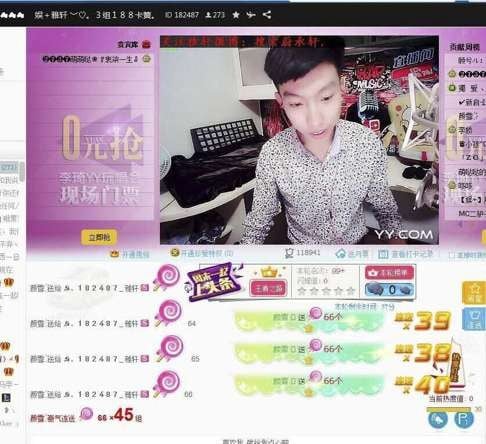
China’s mania for live streaming reaps big rewards for online celebrities
Meet the do-it-yourself internet stars and their armies of fans happy to spend thousands of yuan on memberships and virtual gifts as they watch them dress up and perform songs in front of webcams
Coloured contact lenses and fake eyelashes firmly in place, a young woman belts out the latest Chinese love ballad from her bedroom, done up princess-style in pink. Tens of thousands of adoring fans watch her sing as the performance is streamed in real time via the webcam on her home computer.
Heart emoticons and comments roll across the screen in rapid succession as viewers respond to 23-year-old Shen Man’s performance – “You’re so beautiful”, “Please sing another song!”
READ MORE: The five most popular hosts on Chinese live-streaming site YY.com

Shen is among 900,000 registered users who regularly live-stream themselves singing, telling jokes or even giving tips on popular software via YY.com, one of China’s largest video-based social networks.
Since she started streaming on the site two years ago, Shen, known affectionately to fans as ManMan, has attracted an average of 15,000 viewers, who log on to watch her two-hour show every night.
Cynics might say that Shen appeals to China’s population of zhai nan – nerdish guys more comfortable staying at home in front of computer screens than going out with friends.
To be sure, many of YY’s live-streaming personalities are pretty young women or amateur musicians, but the platform isn’t just for dolled-up girls or wannabe singers.
David Li Xueling, who earlier set up ChinaFotoPress, a leading Chinese photo agency, launched YY in 2008 as a platform for online gamers to talk strategy in real time. Since then it has branched out to provide chat rooms for different interest groups as well as individual live streaming – people seeking to share their views or talents, from tutors to current affairs commentator to amateur magicians.
The growing popularity of the live-streaming service rides on tech-savvy Chinese craving a real-time connection with these internet personalities. Unlike conventional showbiz stars who are mostly inaccessible, YY “hosts” actively respond to comments and requests.
With Xiaomi boss Lei Jun as a heavyweight co-founder, Li listed YY on Nasdaq in 2012. The company now claims to have 10 million registered performers, and an average of 122 million monthly active users.
Its burgeoning online music and entertainment business boosted net revenues by nearly 50 per cent to 1.49 billion yuan (HK$1.8 billion) in the third quarter of 2015, despite losses in its gaming business and fierce competition from Chinese rivals including Douyu TV, Youku Tudou and, more recently, Panda TV.
The trend follows that of video-streaming giants such as YouTube which offer live broadcasts, and has been fuelled by new apps such as Periscope that let users live-stream from anywhere with a smartphone.
However, YY is among the first companies to turn their social live streaming into a revenue source.
The key is engaging viewers and getting them to show appreciation of their favourite online personalities by sending virtual gifts – emoticon-like representations of roses, rings and even luxury cars, which flash across the screen during the show.
Fans pay between one yuan and 20 yuan for a gift. The company pockets part of that sum as commission, while the remainder goes to the individual performer.
This can add up to a considerable sum for the most popular “hosts”, some of whom have been able to make a living simply from their live streaming shows. Shen is one such video star.
According to a Xinhua report, she now earns up to 300,000 yuan a month from her shows. No wonder she quit her job as a nurse in 2013; it paid a mere 2,000 yuan.

Shen takes care to show gratitude for the gifts, too. When a fan showers her with 520 diamond rings – a symbolic number that sounds like “I love you” in Putonghua – she pauses in the middle of a ballad to express her appreciation.
“Thank you ‘Divine Emperor’! Love you, too!” she tells a VIP fan, referring to his online handle, and flashes a cute smile.
Anyone can watch the live-streamed shows free of charge on YY, but most fans prefer to sign up as members of the service, which gives them access to virtual currency needed to buy gifts. There are seven tiers of membership, and the higher the level, the more digital currency viewers can spend on their favourite performers.
A crown symbol appearing beside the Divine Emperor username shows that he is a King member, the top level of membership, which doesn’t come cheap – it costs 120,000 yuan to buy in, with monthly renewal at 30,000 yuan.
He also tops the VIP contribution chart, which refreshes weekly to show the biggest spenders for the period. After three nights, Divine Emperor has spent almost 90,000 yuan in gifts.
That might seem a ridiculous waste of money to others, but fans don’t give it a second thought.
“You wouldn’t ask smokers whether they think it’s worth spending so much money buying cigarettes, would you?”asks Shen Huihui, a 20-year-old woman from Henan province.
She tunes in at least five times a week and spends about 1,000 yuan a month on gifts for Shen Man.
“It’s not about questioning whether the money is worth it ... listening to ManMan sing love ballads has become a habit,” she says.

But with several hundred thousand registered performers, it’s hard to stand out and win a following, says Wei Chengxuan, a 19-year-old from Heilongjiang province.
“The first month I earned 2,000 yuan, but I haven’t earned much since,” says Wei, who has been streaming live performances on YY for three years.
The aspiring singer attracts about 300 viewers every night and his income from virtual gifts is unpredictable.
“But it’s not just about earning money, I’m doing it so I can make friends and practise singing,” Wei says. He pairs up with other singers from time to time and co-hosts performances that appear on a split screen.
The live streaming personalities and their follower are one of the many virtual communities fuelled by the growth of new media in China.
“People are getting more segregated in the real world... some people can get a sense of belonging in the online world. These are the things we fantasise about and want to attain, but cannot get it in reality,” says Tommy Tse Ho-lun, an assistant professor of sociology at the University of Hong Kong.
A similar trend has emerged in South Korea, called muk-bang or “eating broadcasts”, which involve viewers logging on to watch an individual chomp through a spread that might feed a small family.
Although there hasn’t been much research so far, online media reports suggest one factor driving the trend may be that lonely Koreans gain some vicarious satisfaction from sharing the meal.
READ MORE: Sex, fries and videotape: the bizarre food porn of S Korean web sensation Showry
Similarly, Tse reckons that live streaming, which represents an evolution of social media, is especially empowering in Chinese society because it appears to bridge the gap between celebrities and ordinary people.
“People really cherish this opportunity to gain this symbolic power in China because ordinary people in many ways are suppressed,” he says.
“Everyday life can be very limiting, but in a virtual society, people can go beyond their identities, regardless of gender, geographical location, education and socio-economic status.”

Live streaming is also widely embraced because people crave authenticity instead of the highly polished image that celebrities maintain.
In the middle of Shen Huihui’s interview via WeChat, she stops suddenly as the time display indicates 6pm. “Wait, ManMan is streaming right now, I’ll talk to you again when it ends,” she says.
Shen ends the conversation to plug in her headphones and tunes in.

